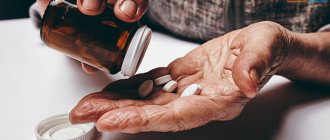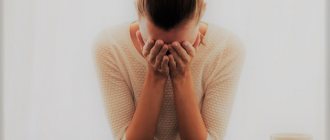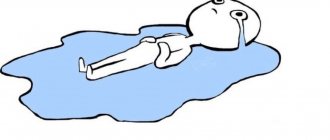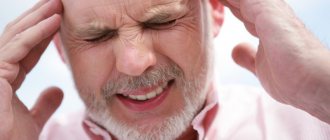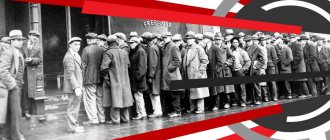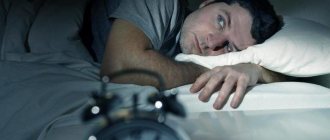- Treating depression at home
Depression is a type of mental disorder accompanied by a decrease in emotional background, inhibited motor activity and a disturbance in realistic thinking. It is important to note that in the modern world, many people are susceptible to this disease due to a hyperactive lifestyle, as a result of which the central nervous system cannot withstand constant stress without the required amount of rest.
Causes of depression
According to statistics, in 90% of cases, the main cause of depressive illness is:
- Affective disorder
- Presence of psychological trauma
- Prevalence of persistent chronic stress.
If the catalyst for depression is psychological trauma, it is considered reactive. They are characterized by such events as the loss of a loved one, the destruction of relationships, the emergence of conflict situations with the work team, an unstable financial situation, reaching retirement age, moving to another city or country.
The occurrence of a depressive state when a person achieves success in the business he has begun deserves special attention. Professional psychologists explain this phenomenon by the fact that there is a temporary loss of goals and meaning for further life activities. Neurotic depression occurs due to a constant state of stress. It is often almost impossible to find a specific reason that can contribute to its development. As a rule, during the research process, the patient begins to describe his life as a continuous series of failures and losses, which most often has an unrealistic assessment of what is happening.
Females are more susceptible to depression than males. Regarding age, the number of cases in people of mature age is higher than in the younger generation. However, there are other factors that cause diseases: these are extreme indicators on the scale of excessive financial wealth and poverty, low self-esteem, dissatisfaction with oneself, childhood trauma, lack of social contacts in society, “black sheep” syndrome.
Considering the total number of mood disorders, 1% is endogenous depression as a rare disease. It leads to periodic depression with the spread of manic psychosis. Appears as a result of pathologies that arise in the metabolic process of amines of the biogenic group, slowing down or accelerating metabolic processes, usually developing with aging.
The next group of reasons is anatomical, implying diseases at the somatic level or pathological processes localized in the brain. According to studies, in half of cases depression occurs during rehabilitation after a heart attack or stroke, 60% are due to chronic diseases of the cardiovascular system, 15% suffer from TBI (traumatic brain injury).
The likelihood of depressive conditions increases if hormonal levels change (pregnancy or menopause). The body undergoes serious physiological changes that are reflected on the emotional and physical level. Often a person begins to get tired faster, the period of active performance decreases, memory and attention deteriorate. Such changes are accompanied by age shifts: some grow up, some grow old, teenagers move into the stage of adolescence.
The most common somatic ailments include ischemia, diabetes of any group, diseases of the gastrointestinal tract, central nervous system, liver, and kidneys. Citizens suffering from any type of addiction are also susceptible to depression.
Classification of depression
In the generally accepted classification, the following types of depression are distinguished:
- Clinical or major
- Small
- Atypical
- Postpartum
- Recurrent
- Dysthymia
- Endogenous.
- Treatment of schizotypal depression
Each type has its own specific characteristics that deserve separate consideration.
Clinical (major) depression
A distinctive feature is a decrease in the positive emotional state, rapid fatigue appears, energy quickly disappears, previous hobbies no longer evoke positive emotions, lack of interest in the world around us, loss of appetite and good sleep, formation of a negative assessment of current events (a person sees everything in “black » color), thoughts of suicide may appear. The average period of prevalence of symptoms is up to 14 days.
Symptoms develop gradually; as a rule, their occurrence is provoked by the presence of constant stress or pressure.
Minor depression
Considering the disease from a clinical point of view, this type is characterized by a minor disorder. As a rule, there are a maximum of 2 affective syndromes that last for two weeks or longer.
Atypical depression
Distinctive signs are a depressed state, a low emotional background, and an apathetic state. As for physiological signs, appetite often begins to increase, drowsiness increases, anxiety increases, and panic attacks may occur.
In practice, in addition to the use of tranquilizers, stabilizers are used, as well as drugs that can quickly raise the emotional mood. They suppress anxiety and panic attacks.
Postpartum depression
One of the most common types that appears as a result of labor. This category also includes women who have experienced an abortion or stillbirth. The main reason for pregnancy is the occurrence of significant hormonal imbalances.
If a woman loses a child, depression can transform into one of the classic types. It can be endogenous, classical, psychogenic or another type. In practice, the onset of postpartum depression occurs in the first 2-4 months. The mother first of all ceases to show interest in her own child, the emotional background is heightened, and there may be a lack of desire to show care.
Recurrent depression
A disease that is often classified as bipolar disorder. A distinctive feature is not only the repetition, but the duration of presence. In practice, the disease occurs every month for several days. In some cases, the disease is diagnosed as a seasonal type: it can develop in autumn or winter due to changes in the length of the day.
Dysthymia
It is characterized as a steady decrease in the emotional background. However, the intensity of its manifestation is an order of magnitude lower than in the case of clinical depression. The disease can persist for more than two years. Some patients suffer from major depression.
Endogenous depression
Classified as a severe type of disease. As a rule, a severe form of the disease occurs as a result of internal changes in the body, which are localized in the brain. Neurotransmitters, which serve to transmit nerve impulses to the brain, begin to be produced in smaller quantities. As a result, the patient develops persistent signs of depression, and minor experiences or stressful situations may be present.
With the development of the endogenous type of depression, its development occurs gradually. Within a few weeks, the patient's condition can completely change. Apathy, tearfulness and despair quickly appear. The patient refuses to communicate with loved ones, may not leave the walls of his home for a long period of time, and an apathetic state and tearfulness appear. Physiological changes also occur: refusal to eat, intermittent and restless sleep. A person stops responding to external irritating factors.
Treatment of the disease is carried out exclusively with medication, since the main cause is a decrease in the concentration of hormones in the brain. By taking antidepressants, the content of norepinephrine increases and serotonin increases. Normalization of physical condition can be achieved within a couple of weeks.
Depression is unipolar
The main signs of unipolar depression usually include general depression, sadness, and a tearful mood. It is rare that a patient experiences positive emotions; most often life is seen in black and gray colors. Depending on the degree of progression of the disease, specialists select treatment on an individual basis: drug therapy and mandatory work with psychologists.
Unipolar depression is characterized by viewing one's own life only in a negative way. However, from a manic-depressive state, the bipolar form does not imply a sharp change in the emotional background. A change in depressive mood is characterized by the onset of a brighter streak in life.
Important: starting from the 20th century, cases of the disease began to become more frequent. According to studies, about 18% of the world population suffer from this disease. Also, numerous observations by specialists have shown that women are more susceptible to depression than men. Has no relationship with age category. If the most effective therapy is carried out, then in 2/3 of cases there is a significant improvement and complete elimination of the disease.
How is diagnostics carried out?
Any mental illness manifests itself in each patient with its own unique symptoms, and unipolar depression is no exception. There are five symptom categories that describe unipolar depression:
- Emotional. A person experiences a feeling of sadness, loneliness, and often unreasonable tearfulness appears. Increased levels of anxiety and anger
- Motivational. For the patient, any activity loses any meaning. Any actions (communication with other people, work, participation in family life) do not bring any positive emotions. When the form is advanced, suicidal tendencies may appear
- Behavioral. Activity is reduced to a minimum, most often the person spends time in bed. It is not uncommon to experience slow performance of any action, even if it is performed every day
- Cognitive. Reduced self-esteem leads to a lack of self-confidence; there is a desire to protect oneself from other people and reduce the number of contacts with them.
- Physical. Somatic manifestations appear in the form of headaches of varying intensity, dizziness, and often decreased background activity.
As a rule, a diagnosis is made if at least 5 of the above symptoms are present. Each duration is at least two weeks. In addition, the diagnosis is confirmed by specialists if hallucinations of various types (semantic, auditory, visual) or delusions occur.
In order to identify what type of depressive disorder a person suffers from, therapeutic methods are used: cyclic, catonic or postpartum. The patient also attends mandatory conversations with a psychologist, which makes it possible to identify the causes of the development of a depressive state.
Depression unipolar
Since the 20th century, depression has increasingly manifested itself in people living in large cities. An endlessly active lifestyle, daily solution of a large number of problems leads to the fact that patients become middle-aged people of 30-40 years old. According to statistics, unipolar depression is most often diagnosed in females. In addition to the pathological condition, with this type of disease a person experiences a mental disorder.
Reasons for development
A distinctive characteristic of this type of depression is the manifestation of negative emotions without manifestations of the manic type. Despite the fact that depressive symptoms tend to recur, mania does not appear.
The main reason for the development of unipolar depression is considered to be exposure to constant stress: breakup of relationships, loss of a loved one, natural disasters. In some situations, even a positive event that evokes strong emotions can lead to the development of depression.
If a person has many small troubles or one serious event. However, it acts only as an impetus and does not subsequently affect the progression of the patient’s condition. Among the studies conducted, experts concluded that the most common event that affects the formation of unipolar depression is divorce.
Another equally important aspect is learned helplessness. When stress affects the body so much that normal sleep and appetite disappear, and general physical weakness develops.
Features
Among the main signs of unipolar depression, the following aspects can be distinguished:
- Loss of interest in surrounding events
- Low self-esteem prevails
- Lack of emotional displays
- Dark and negative thoughts predominate
- Sleep problems begin.
Often the patient loses interest in events that are happening in the world. It becomes increasingly difficult to concentrate one's attention on performing various tasks. Despite constant fatigue, it is difficult for a person to fall asleep at night.
The predominance of low self-esteem leads to the fact that a person becomes unsure of himself and constantly feels guilty about any events. The future is perceived only in negative terms.
The main difficulty is the fact that a person purposefully looks for only negative aspects in all actions and events. Suicidal thoughts may often occur. Since the level of aggression often becomes elevated, a person tries to protect himself as soon as possible from contact with other people, even close ones and relatives. How actively side symptoms will appear depends on what stage of development the disease is at.
To combat unipolar depression, visiting a psychologist is mandatory. For acute attacks, medications may be used.
First aid for depression What to do to avoid having an attack
The age when a person solves all his problems, accumulated grievances and fears in a psychologist’s office has come. Humanity has become extremely susceptible to depression and its various types. Often, a simple bad day turns into a lifelong nightmare and further self-depression.
Causes of attacks of depression:
- Lack of certain substances in the body (serotonin, dopamine, norepinephrine);
- Psychological trauma;
- Frequent negative thoughts;
- Hereditary predisposition;
- Prolonged stressful situations.
There are a huge number of reasons that cause attacks of emotional depression, but according to experts, every such case can be stopped, even extremely serious ones.
The simplest things at first glance can work wonders.
What you need to do to avoid falling into an attack of depression. Recommended methods:
- Searching your memory for something pleasant or even funny. Make a list of good memories not just mentally, but write them down on paper, choose one and focus your attention on it, remember it down to the smallest detail.
- Don't walk around doing nothing.
The oppression will only get worse if you sit back and shed tears. Leaving home will be the right decision. Going to the cinema, going shopping, taking a walk in the park, visiting the library - this is an incomplete list of possible activities that will provide some relief. Or you can do something completely boring, for example, cleaning the kitchen tiles with a toothbrush. - Sport is a good helper in the fight against depression.
Exercising in the gym or at home, cycling or intense jogging will help take your mind off unpleasant thoughts. Exercise to the point of complete physical exhaustion, so that there is no strength left for depression. - You should speak out well.
It will definitely help if you share your experiences. Friends, loved ones, relatives - everyone, those you can trust, will be happy to help. By keeping all emotions and experiences inside, a person often only makes things worse. Hiding depression behind the mask of “everything is fine” destroys oneself from the inside, preventing one from being able to help. - Pour out your feelings on paper.
There may not be anyone around whom the person trusts, or the reasons are so secret that it is embarrassing to tell someone, so in this situation the best way out would be to keep a diary. Research shows that writing down unpleasant thoughts and experiences for 15 minutes every day improves people's emotional well-being.In addition, feelings can be sketched. A box of pencils (paints, markers), a blank sheet of paper, and now negative thoughts and emotions are not in your head, but on paper. It's better to use a lot of different colors.
- Proper nutrition!
The key to a good mood is associated with a sufficient amount of carbohydrates in the body, periodic consumption of fish, avoiding excessive consumption of coffee and soda containing caffeine and limiting alcohol. You can’t drink depression with alcohol! The ethanol contained in such drinks is a depressant. And the best fish options are salmon, tuna, mackerel, and sardines. They contain omega-three fatty acids, which are associated with the production of the internal antidepressant serotonin. - Have a good cry.
Some people believe that crying is for the weak. But few people know that having a good cry is a very useful method in the fight against depression. You should cry not about something abstract and general (wars, famine), but precisely about the problem that drives you into a depressed state. - A good way out is to join the spiritual sphere of life.
Visiting church, reading holy scripture at home, alone or with loved ones, a simple “conversation” with higher powers will give strength to resist the blues. This is just advice and should not be regarded as a mandatory rule. - It's no use getting hung up on it. Illusory goals that a person sets for himself and unconfirmed facts can also drive depression into depression. Things that fail over and over again should be let go and not waste energy and emotions on them. And it’s realistic to evaluate far-fetched false events; perhaps there’s nothing to worry about.
When should you seek professional help?
Moving, death of a loved one, divorce, dismissal - all this and much more can lead to a more or less permanent deterioration of mood. Every person has experienced mild depression at least once in their life.
However, if the depressed state lasts more than 2 weeks and is accompanied by sleep and appetite disturbances, loss of the ability to concentrate, and thoughts of suicide, most likely, the help of a doctor is required.
It is he who will determine whether antidepressants are needed or psychotherapy is sufficient, although both options may be useful.
At the end of all of the above, it should be noted that all problems, no matter how terrible they may seem at the beginning, are solvable, you just have to start sorting them out and not isolate yourself from people who are eager to help.
ADDITIONAL INFORMATION
Source: https://pervaya-pomoshh.net/pervaya-pomoshh-pri-depressii-chto-delat/
Symptoms of depression
In medicine, a triad of symptoms has been defined, which is the main one when depression occurs as a disease:
- Worsening mood
- Decreased activity of the musculoskeletal system
- Inhibition of thought processes.
The first aspect is often characterized as melancholy, a feeling of hopelessness, a feeling as if a person is losing bright prospects for his future life. Increased levels of anxiety are often observed, alternatively known as anxious depression. It seems that the meaning of life has been lost, old hobbies and interests lose their meaning and do not bring any satisfaction. Self-esteem suffers. First of all, the patient begins to blame himself for all the “deadly sins.” Suicidal thoughts may appear, and there is less and less contact with other members of society. With the development of neurotic depression, as a rule, the situation develops in the opposite way: they begin to blame the people around them for all the troubles.
With the development of a complex and prolonged depressive state, a person may lose emotional sensitivity. He may feel some emptiness inside. Some patients experience an association with unbearable physical pain. Throughout the day, sensations can fluctuate significantly. If an endogenous type of disease develops, then the peak of negative emotions occurs in the first half of the day or very early morning, and in the afternoon the situation changes dramatically, since well-being improves significantly. Psychogenic depression, on the contrary, assumes a normal emotional background in the first half of the day, and the closer to the evening, the stronger the depressive state manifests itself.
Due to the fact that thought processes are seriously slowed down, a person may have difficulty planning his own day, the learning process is difficult, and solving standard problems requires maximum effort. Perception deteriorates, information is practically not remembered. According to the patients themselves, they begin to feel slower in their actions; in order to carry out a mental operation, a large amount of effort is required. The disease also negatively affects the formation of speech: the patient increasingly arrives in silence and practically does not conduct dialogues. As a rule, the answers are monosyllabic “yes” or “no”.
Treatment of depression
The principle of treatment depends on the diagnosis of a specific type of depressive state. Some of them may not require serious intervention from specialists, but in the case of a stable form, a whole work plan is developed, which the patient must follow without fail in order to achieve the most effective results.
Treating depression at home
Complex forms of depression do not need to be treated in an inpatient setting. When visiting, specialists may prescribe medications. As a rule, they are selected individually depending on the state of health of the body and its specifics, so doctors strongly do not recommend purchasing medications without prior consultation.
Traditional methods are also effective, among them are herbal remedies that soothe and tone the central nervous system. An equally important and responsible measure is the normalization of the schedule and diet and sleep. In addition, you can visit a psychoanalyst who will help stabilize your emotional state.
Another effective method of reducing anxiety and raising the emotional level is aromatherapy. This is a pleasant procedure that is not difficult or financially expensive to organize at home.
Treatment of depression in the clinic
Treatment of depression in a hospital setting occurs exclusively in the most severe cases, when a person flatly refuses to eat, practically does not sleep and completely renounces the outside world. It is important to take into account that in most cases, in order to get rid of a complex form of depression, specialists act comprehensively, using not only effective medications, but also conduct individual therapy, conversations, and hypnosis.
Treatment should be selected exclusively on an individual basis, after collecting a high-quality anamnesis, as well as determining the extent of the disease and its progression.
Treatment of depression with folk remedies
The optimal method for those patients who doubt the individual tolerance of medications or completely refuse to take them. Among the most common methods are the following:
- Foot massage. Not only is it an excellent therapeutic agent, but it can be used as a preventative measure. If it is not possible to massage manually, you can purchase inexpensive products made from wood.
- Meditation or yoga practice. Ideal for home use. Physical activity brings a person into the necessary tone, acts on the central nervous system as a sedative
- Using tea made from herbs: peppermint, orange or valerian. You can prepare a relaxing bath by adding blueberry juice, St. John's wort or horsetail
- Take st. a spoonful of table salt and dilute it per liter of boiled water. Apply all over the body and rub.
Honey has a calming effect. It can be used in conjunction with other additives, for example, bee bread. When consumed 2-4 times daily, you can see an improvement in vitality, the appearance of former activity and the emergence of a positive mood.
Treatment of depression with antidepressants
Some antidepressants can be purchased independently at any pharmacy and do not require a doctor's prescription. However, this does not mean that they can be taken thoughtlessly when the first possible signs of depression occur. Before you start taking any drug, it is strongly recommended to visit a doctor who will tell you which drugs are allowed to be used in a particular situation.
It is customary to distinguish several groups of medications that affect the inhibition process:
- Tricyclic. Drugs in this category belong to the first generation. When used, norepinephrine and serotonin are not reuptaken. The most common drugs are Doxepin, Nortriptyline, and Desipramine. However, the drugs have a large list of side symptoms: the appearance of tremors in the hands, the functioning of the cardiovascular system is disrupted, and disorders of the visual system occur
- Drugs whose action is aimed at capturing the reverse type of norepinephrine and serotonin. They are widespread if a person has a constant feeling of fear that cannot be overcome by ordinary methods. Panic attacks and aggression may also appear. If you do not follow the prescribed dosage, serotonin will begin to accumulate in the body. The main representatives include Sertraline and Fluoxetine.
- Selective inhibitors. Practiced to combat obsessive phobias. Common symptoms include cyclical sleep disturbances and the development of a depressive state. As a result, weight may increase uncontrollably and a constant feeling of lack of sleep appears.
- Heterocyclic drugs. Relevant for use when working with elderly patients if there is persistent sleep disturbance or a developing depressive state.
In any situation, it is not recommended to independently select medications for constant use in order to avoid deterioration of the physical and psycho-emotional state.
Psychological assistance for depression
When starting to work with a depressed person, it is important for a psychologist to determine what caused it.
There are many types of this condition, depending on its causes. But the methods for solving this problem are similar in many cases. The work of a psychologist is carried out individually with a person suffering from depression. It is immediately important to reduce the intensity of the experience, as well as help the person understand the cause of this condition. There are several methods and approaches to working with depression.
Psychoanalysis and treatment of depression
Psychoanalysts consider depression from two sides: firstly, it is a negative emotional state that dulls emotions, leads to apathy and reduces mental and physical activity. Secondly, this state returns us to focusing on our desires and life goals. The positive function of depression is that a person running away from himself returns again to the origins of where we began our life's journey.
In their work, psychoanalysts strive to find out why apathy began. It is important to go through the barrier of rationalization (psychological defense that gives false answers to questions about the cause of internal difficulties) in order to understand the true cause of this condition. As a result of working with a psychoanalyst, a person receives an answer to the question of where and what he did wrong, when he turned away from a comfortable path, which led to depression.
Psychoanalysts study in detail the causes of depression in infancy. It is generally accepted that complex cases of this disease originate from there. If the patient’s mother had postpartum depression or was unable to meet the child’s need for close emotional contact, depression in such a child as an adult is very difficult. The psychoanalytic method has a long-term impact on the human psyche.
NLP is an effective method of combating depression
NLP techniques allow you to reveal the internal resources and reserves of human strength. A specialist helps a person identify and understand his true values and needs.
If psychoanalysis is based on the experience of past negative experiences, then NLP does not tamper with the client’s psyche, but helps to form positive attitudes and teaches new behavior.
A specialist, using neurolinguistic programming methods, helps to formulate specific goals for life and achieve them.
When working with a client suffering from depression, a specialist includes almost all channels of information perception:
- gustatory – perception of information according to taste;
- olfactory - a person remembers something new by smell;
- visual – perception of the environment through vision;
- kinesthetic – receiving information through touching the skin;
- auditory - the perception of something new through the organs of hearing.
Diagnosis and treatment of depression
Diagnosis of depression is carried out only after collecting a high-quality and as complete anamnesis as possible, passing tests and talking with the patient. To be diagnosed with depression, a patient must have at least two of the triad and three of the associated symptoms. Among the second group, the most common are unreasonable feelings of guilt, increased anxiety, low self-esteem, suicidal mood, and decreased appetite. If a doctor suspects the development of depression, he will redirect the patient to other specialists, depending on what symptoms he is experiencing.
Outpatient treatment often includes types of depression such as recurrent, atypical, postpartum or dysthymia. If the disorder reaches a critical point, then inpatient treatment can be arranged. Depending on the individual case, various methods can be used, ranging from psychotherapy to the latest generation of pharmacological drugs. In the latter case, it is important to note that modern drugs cause a minimal number of side symptoms, which has a positive effect on the effectiveness of treatment.
Among the most popular drugs are antidepressants. If inhibition is observed, then drugs with a stimulating function are used, and in case of anxiety, drugs with a sedative effect are used.
The response to antidepressants also manifests itself differently, depending on the individual body's response.
Help from a psychologist for depression - prices
Individual consultation with a psychologist in Moscow: 4000 rubles per hour, Park Kultury and Yugo-Zapadnaya metro stations, Moscow, exact address
Help from a psychologist online (Skype, Viber, WhatsApp) : 4000 rubles per hour
Phone: / write to WhatsApp or Viber
Skype: maria.sigal3/write on Skype
You can view all services on the page Psychologist Services
